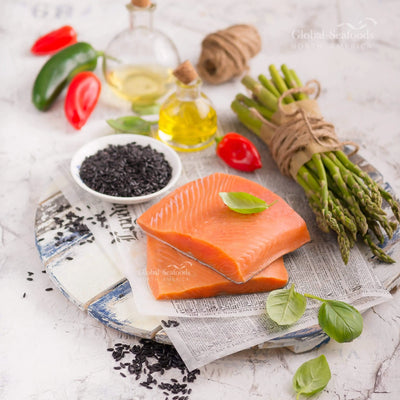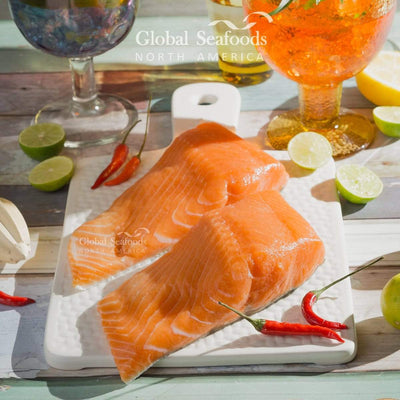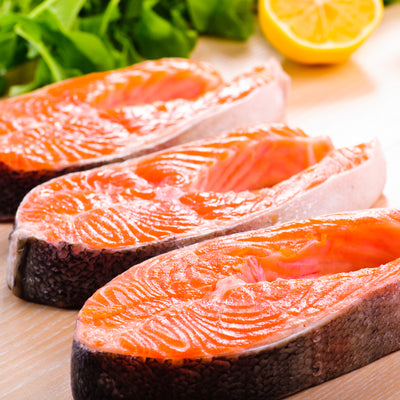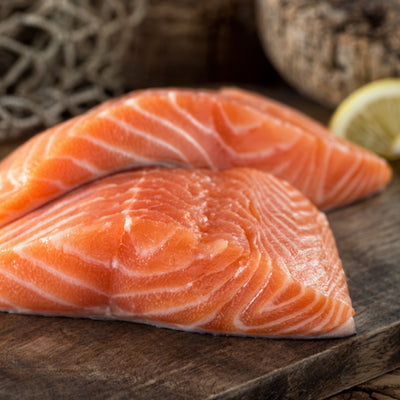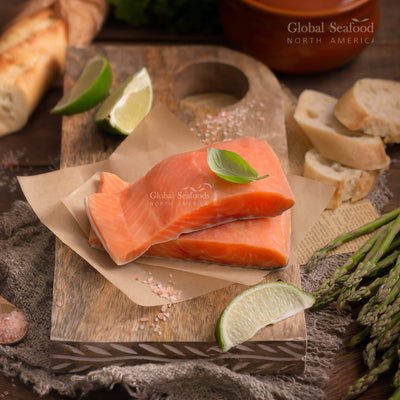+Shop Now
+Categories
- Abalone
- Ahi Tuna
- Alaskan King Crab Legs
- Alaskan Pollock
- Alaskan Sockeye Salmon
- Albacore Tuna
- Anchovy
- Anxiety Relief
- appetizer
- Atlantic Salmon
- Beluga Caviar
- Best Sushi
- black caviar
- black cod
- Blue crabs
- Bluefin Tuna
- Brain Function
- Branzino
- breakfast
- Calamari
- caviar
- Caviar Recipes
- Chef Knives
- Chilean Sea Bass
- Clams
- cocktail caviar
- Cod
- Coho Salmon Caviar
- collagen
- Cooking Methods
- crab
- Crab Balls
- Crab Cakes
- Crab claws
- crab meat
- Crab Recipes
- culinary tips
- decline-sturgeon
- Diver Scallops
- Dover Sole
- Dry Aged Fish
- Dungeness Crab
- Dungeness crab clusters
- Dungeness Crab Legs
- Exotic Shellfish Sampler
- Fish and Seafood
- fish oil
- Fish Sauce
- flat fish
- FLOUNDER FISH
- Focus
- Fresh Seafood Delivery
- Fresh Wild Alaskan Salmon
- Geoduck
- Gooseneck Barnacles
- Gourmet Seafood Platter
- haddock
- halibut
- Halibut Recipes
- hamachi
- Hamachi Recipe
- health
- healthy eating
- Ikura
- Japanese restaurants
- Jonah crab
- Jumbo Sea Scallops
- Kaluga Caviar
- kelp
- king crab
- King Crab Legs
- King Salmon
- kitchen
- Lingcod
- Live King Crab
- Live Lobsters for Sale
- Live Scallops
- Live seafood
- lobster
- Lobster Tail
- luxury food
- mahi mahi
- Marine Collagen
- Mollusk
- Monkfish
- Mussels
- New
- Nutrition
- octopus
- Opah
- Ora King Salmon
- Osetra Caviar
- Ossetra Sturgeon Caviar
- oysters
- Pacific Cod
- Pacific Hake
- Pacific Halibut
- Pacific Ocean
- Pacific Whiting
- Pacific Whiting Recipe
- Paddlefish Caviar
- Petite Oysters
- Petrale Sole
- Poke Tuna
- Pollock
- Pregnancy
- Premium Caviar Selection
- Recipe
- red caviar
- Red Crab
- rock fish
- Rockfish
- Rockfish Recipes
- sablefish
- Sablefish (Black Cod) Recipes
- salmon
- Salmon Caviar
- Salmon lox
- Salmon Poke
- Salmon Recipes
- salmon roe
- Sardines
- Sashimi
- Sashimi-Grade Tuna
- Scallop
- scallops
- Scallops Recipe
- Sea Urchi Recipe
- sea urchin
- Sea Urchin Sushi
- sea weed
- Seafood
- Seafood Dishes
- Seafood Market
- Seafood Recipe
- Seafood Restaurants
- sevruga caviar
- shellfish
- Shrimps & Prawns
- Silver Salmon
- Smoked
- Smoked Salmon
- Smoked Tuna
- Snail Caviar
- Snapper Recipe
- snow crab
- Sole & Flounder Recipes
- Squid
- Steelhead
- Sturgeon Caviar
- Sustainable Seafood Choices
- Swordfish
- Tilapia
- Tilapia Fish
- Tobiko
- Trout
- tuna
- Tuna Recipe
- weathervane scallops
- white fish
- White Sturgeon
- White Sturgeon Caviar
- Whiting Fish
- Wild Caught Shrimp
- Yellowfin Tuna
- Yellowtail snapper
Pollock vs. Salmon: A Nutritional Face-off
October 03, 2023

Pollock vs. Salmon: A Nutritional Face-off
When it comes to seafood, two fish often find their way onto our plates - Pollock and Salmon. Both are popular, but are they equal in terms of nutrition? In this blog post, we'll dive deep into the nutritional face-off between Pollock and Salmon, helping you make informed choices for your diet.
The Battle Begins: Pollock
Pollock Nutrition Facts
Calories:
Pollock: 92 kcal per 3.5 ounces Salmon: 206 kcal per 3.5 ounces
Protein:
Pollock: 19g Salmon: 25g
Omega-3 Fatty Acids:
Pollock: 280mg Salmon: 2,260mg
Vitamins:
Pollock: Rich in B vitamins Salmon: High in vitamin D and B vitamins
Pollock is a lean, white fish known for its mild flavor and flaky texture. It's an excellent source of protein while being relatively low in calories. However, it doesn't have as many omega-3 fatty acids as Salmon.
Salmon Takes the Stage
Salmon Nutrition Facts
Salmon is often hailed as a nutritional powerhouse. Let's see how it compares to Pollock.
Calories:
Pollock: 92 kcal per 3.5 ounces Salmon: 206 kcal per 3.5 ounces
Protein:
Pollock: 19g Salmon: 25g
Omega-3 Fatty Acids:
Pollock: 280mg Salmon: 2,260mg
Vitamins:
Pollock: Rich in B vitamins Salmon: High in vitamin D and B vitamins
Salmon stands out with its rich pink color and distinctive flavor. It's not only delicious but also packed with omega-3 fatty acids, making it an excellent choice for heart health.
FAQS
Q1: Which fish is better for weight loss, Pollock, or Salmon?
Both Pollock and Salmon are relatively low in calories, but Salmon's higher omega-3 content can aid in weight loss and offer additional health benefits.
Q2: Are there any mercury concerns with these fish?
Pollock is considered a low-mercury fish, making it a safer option, especially for pregnant women and children. Salmon, while generally low in mercury, can vary depending on the source.
Q3: Can I use Pollock as a substitute for Salmon in recipes?
Yes, Pollock can be a suitable substitute in many recipes, especially if you're looking for a more budget-friendly option.
Conclusion
In the Pollock vs. Salmon nutritional face-off, both fish have their merits. Pollock is an excellent source of lean protein and is lower in calories, making it a great choice for those looking to manage their weight. On the other hand, Salmon's high omega-3 fatty acid content and additional vitamins make it a nutritional powerhouse that can benefit your overall health.
Ultimately, the choice between Pollock and Salmon depends on your dietary preferences and health goals. Incorporating both into your diet can provide a balanced intake of nutrients and add variety to your meals. So, go ahead and enjoy the best of both worlds when it comes to these delicious and nutritious fish!
If you’re looking for the freshest, highest-quality whitefish, Global Seafoods offers a premium selection perfect for any seafood dish. Whether you prefer grilling, pan-searing, baking, or frying, our wild-caught whitefish delivers unmatched flavor, texture, and nutrition.
Explore Our Top Whitefish Selections:
🐟 Pacific Cod Fillets – Mild, flaky, and versatile, perfect for fish tacos, frying, or baking.
🔗 Shop Pacific Cod Fillets
🐟 Lingcod Fillets – Firm and slightly sweet, making it ideal for grilling or pan-searing.
🔗 Shop Lingcod Fillets
🐟 Alaskan Pollock Fillets – A lean, budget-friendly option, great for fish sandwiches or crispy fried fish.
🔗 Shop Alaskan Pollock Fillets
🐟 Pacific Whiting – Light, delicate, and perfect for soups, stews, or light pan-frying.
🔗 Shop Pacific Whiting
🐟 Chilean Sea Bass – A luxurious, buttery fish with a rich flavor, perfect for high-end seafood dishes.
🔗 Shop Chilean Sea Bass
🐟 Halibut Cheeks – Known for their tender, succulent texture, great for sautéing in butter or grilling.
🔗 Shop Halibut Cheeks
🐟 Explore More Whitefish Options – From flaky cod to premium Chilean sea bass, we have something for every seafood lover.
🔗 Shop Whitefish Collection
All of our wild-caught whitefish are packed with lean protein, omega-3s, and essential nutrients, making them a healthy and delicious choice. Order today from Global Seafoods and enjoy the freshest seafood delivered to your doorstep!
Related Products
Share:
Also in News

How to Make Sea Bream Sushi With Dry-Aged Tuna & Crab Roll — Step-by-Step With Chef Joshua
December 07, 2025
A complete guide to making Sea Bream sushi at home, including filleting, curing, slicing, and building a Dry-Aged Tuna & Crab sushi roll. Chef Joshua shares professional tips for restaurant-quality results.

Cooked Crab for Game Night: Everything You Need for a Perfect Seafood Party
June 27, 2025
Take your game night to the next level with a Cooked crab party. Learn the best recipes, cooking tips, and hosting hacks for a memorable seafood feast.

Steam Crab for Date Night: A Romantic Guide to the Perfect Seafood Feast
June 27, 2025
Make your next date night unforgettable with a romantic Steam crab experience. This guide covers everything you need to know, from ambiance to the best crab varieties.
+Shop Now
+Categories
- Abalone
- Ahi Tuna
- Alaskan King Crab Legs
- Alaskan Pollock
- Alaskan Sockeye Salmon
- Albacore Tuna
- Anchovy
- Anxiety Relief
- appetizer
- Atlantic Salmon
- Beluga Caviar
- Best Sushi
- black caviar
- black cod
- Blue crabs
- Bluefin Tuna
- Brain Function
- Branzino
- breakfast
- Calamari
- caviar
- Caviar Recipes
- Chef Knives
- Chilean Sea Bass
- Clams
- cocktail caviar
- Cod
- Coho Salmon Caviar
- collagen
- Cooking Methods
- crab
- Crab Balls
- Crab Cakes
- Crab claws
- crab meat
- Crab Recipes
- culinary tips
- decline-sturgeon
- Diver Scallops
- Dover Sole
- Dry Aged Fish
- Dungeness Crab
- Dungeness crab clusters
- Dungeness Crab Legs
- Exotic Shellfish Sampler
- Fish and Seafood
- fish oil
- Fish Sauce
- flat fish
- FLOUNDER FISH
- Focus
- Fresh Seafood Delivery
- Fresh Wild Alaskan Salmon
- Geoduck
- Gooseneck Barnacles
- Gourmet Seafood Platter
- haddock
- halibut
- Halibut Recipes
- hamachi
- Hamachi Recipe
- health
- healthy eating
- Ikura
- Japanese restaurants
- Jonah crab
- Jumbo Sea Scallops
- Kaluga Caviar
- kelp
- king crab
- King Crab Legs
- King Salmon
- kitchen
- Lingcod
- Live King Crab
- Live Lobsters for Sale
- Live Scallops
- Live seafood
- lobster
- Lobster Tail
- luxury food
- mahi mahi
- Marine Collagen
- Mollusk
- Monkfish
- Mussels
- New
- Nutrition
- octopus
- Opah
- Ora King Salmon
- Osetra Caviar
- Ossetra Sturgeon Caviar
- oysters
- Pacific Cod
- Pacific Hake
- Pacific Halibut
- Pacific Ocean
- Pacific Whiting
- Pacific Whiting Recipe
- Paddlefish Caviar
- Petite Oysters
- Petrale Sole
- Poke Tuna
- Pollock
- Pregnancy
- Premium Caviar Selection
- Recipe
- red caviar
- Red Crab
- rock fish
- Rockfish
- Rockfish Recipes
- sablefish
- Sablefish (Black Cod) Recipes
- salmon
- Salmon Caviar
- Salmon lox
- Salmon Poke
- Salmon Recipes
- salmon roe
- Sardines
- Sashimi
- Sashimi-Grade Tuna
- Scallop
- scallops
- Scallops Recipe
- Sea Urchi Recipe
- sea urchin
- Sea Urchin Sushi
- sea weed
- Seafood
- Seafood Dishes
- Seafood Market
- Seafood Recipe
- Seafood Restaurants
- sevruga caviar
- shellfish
- Shrimps & Prawns
- Silver Salmon
- Smoked
- Smoked Salmon
- Smoked Tuna
- Snail Caviar
- Snapper Recipe
- snow crab
- Sole & Flounder Recipes
- Squid
- Steelhead
- Sturgeon Caviar
- Sustainable Seafood Choices
- Swordfish
- Tilapia
- Tilapia Fish
- Tobiko
- Trout
- tuna
- Tuna Recipe
- weathervane scallops
- white fish
- White Sturgeon
- White Sturgeon Caviar
- Whiting Fish
- Wild Caught Shrimp
- Yellowfin Tuna
- Yellowtail snapper
Shop Now
Main
News & Updates
Sign up to get the latest on sales, new releases and more…
© 2026 Global Seafoods North America.


